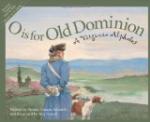About the middle of the eighteenth century the church was moved to its present site. Enclosed within a brick wall and with the tombs of generations of worshippers again clustering about it, Westover Church had settled down once more to revered old age when the ravages of war swept over the land. In that sad war of brothers over a union that this church had seen formed, over soil that it had seen won from Great Britain, the humble old House of God was left dismantled, its graveyard walls thrown down, and its tombs broken. After the war, the church was repaired, and it is still the place of worship for the countryside.
The rectory stood on a bluff near by, overlooking the wide stretch of marsh and the far windings of the stream. We found that the latest of the long line of rectors and equally important rectors’ wives that Westover Church has known were the Reverend and Mrs. Cornick, who told us of the hopes of the little community that the Government would yet pay indemnity for the injury done by Federal soldiers to the old church.
The next morning brought so fine a Thanksgiving Day that our gratitude rose up with the sun—though the rest of us awaited a more convenient hour. The air was crisp; the sky was unclouded. When, in good time for morning service, we went up the hill to the old brick church, we saw horses and carriages lined along the fence. Inside the building some of the people who had come early were having neighbourly confidences over the backs of the pews.
Naturally our thoughts went wandering between service and sermon and church. Sometimes (and through no fault of the good rector either), we would find ourselves far back in the story of that colonial house of worship, and full two hundred years away from the text. We would see this old church as it stood at first on the wild bank of the James, and the families of those early planters gathering in. They would come from up and down the river; some in pirogues and pinnaces and sloops, and some on horseback with the fair dames on pillions behind. Or, somewhat later, lordly coaches would roll to the door bearing colonial grandees.
The plain little church had seen brave attire in those days, when the parish worshipped in flowered silks and embroidered waistcoats and laced head-dresses and powdered periwigs. Then, after the services, would come the social hour, when dinner invitations went round, parties were planned, and there was a general changing about of the guests that were always filling Virginia homes. Doubtless, the lavish hospitality of the master of Westover, who attended this church, caused quite a Sunday pilgrimage to that mansion of his that we had glimpsed through the trees as Gadabout entered Herring Creek.
We went out past chatting groups (stopping for the greeting of the rector and his wife); past horses that were being unhitched and vehicles that were cramping and creaking; on down to the stream where geese were paddling in the marshes, and overhead the rectory doves were wheeling in the sunny air. Rowing down the creek toward the houseboat, we stopped here and there to gather reeds and holly.




